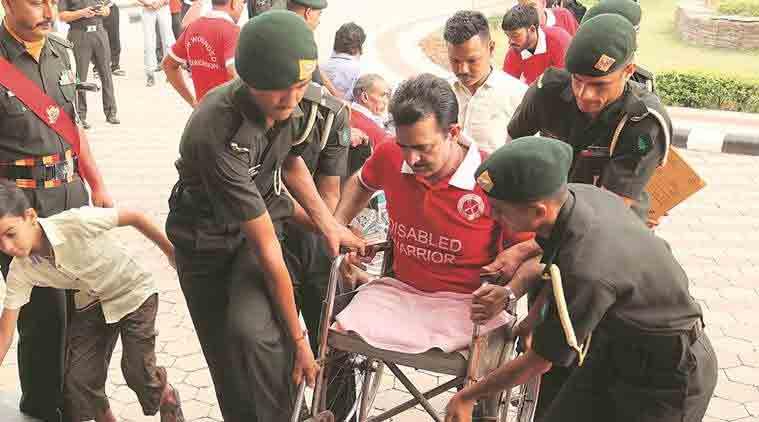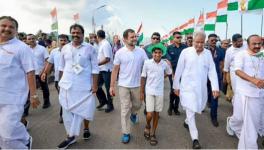Ex-Soldiers Feel Betrayed as BJP Continues to Pursue Cases Against Disability Pension

Image Coutesy: The Indian Express
Hyper nationalism and use of the valour of armed forces for political gains have glossed over the plight of men in uniform. Going against its own expert committee’s recommendations, the Bharatiya Janata Party-led Central government has not yet withdrawn appeals against disability pension pending in the Supreme Court. There are around 1,000 cases – according to Major DP Singh – pending in different courts, with the Ministry of Defence (MoD) as the litigant. This is despite judgements and instructions of the apex court to withdraw unnecessary cases.
Constituted in 2015 to look into the concerns of the armed forces about service conditions and pensions, the expert committee in its report had noted that as almost 90% of the appeals filed by the MoD as on December 1, 2014, pertained to disability pensions.
The BJP government – which in its manifesto for the 2014 general elections had pledged “to minimise appeals by the government against the Armed Forces Tribunal’s orders” – did not walk the talk after coming to power and continued filing fresh appeals till 2017. It filed 800 appeals in the Supreme Court from 2014 to 2017 against the tribunal’s rulings, which were in favour of disabled soldiers, alleged ex-servicemen. It lost all but one. The Supreme Court dismissed over 1,000 appeals against disability pensions, some of them pending from before the BJP came to power, between 2014 and 2018. Though most of the appeals were turned down on the grounds that too much time had lapsed, they said, many were dismissed on merit as well.
There are three types of disability pensions – war injury, normal disability (attributable to the military service) and the one aggravated by the military service. In all the cases, pension is given on the basis of percentage of the disability. A disable defence personnel goes to the military hospital, a board of officers along with specialist doctors decides the percentage of disability and based on the board’s report, the pension of the person is calculated.
Nuances of pension calculation
For 100% disability, the pension of soldiers – which was existing before the 7th Pay Commission – was 30% of the last basic pay withdrawn and military special pay. The basic military special pay of a soldier makes the last emolument basic pay. So, 30% of the last basic drawn used to be paid earlier.
In 7th Pay Commission, the government tried to make this Rs 14,000 for NCOs (non-commissioned officers), Rs 18,000 for JCOs (junior commissioned officers) and jawans and Rs 24,000 for officers. What has happened now is this has reduced the pensions of JCOs and officers. A JCO, for example a subedar major, as per 7th Pay Commission, now gets around Rs 92,000 as basic in addition to his special military pay. This makes his pay more than Rs 1 lakh.
So, 30% was basically around Rs 30,000 to Rs 35,000, which has been reduced by 50%. There are two components – military special pay and difficult area allowances. Military special pay is given to people in defence forces who live or are exposed to extreme environment during most of the duration of their service. Second, their duty entails extreme sacrifices. For officers, it is Rs 15,500 and Rs 5,800 for JCOs and jawans.
“We demand that JCOs and jawans should also be given military special pay of Rs 15,500 because if you look from the humanitarian angle, the exposure is the same for everyone. Therefore, the MSP (minimum support price) should be equal. In fact, it should be enhanced. When they are not given good MSP, their basic emolument for calculation of the disability pension becomes less,” Lieutenant Colonel (retired) DK Nain – secretary general of the United Front of Ex-Servicemen – told Newsclick.
Shockingly, he said, the 7th Pay Commission has put jawans into the class four category. “The Surgical Strike commando (a sepoy) – because of whom the entire nation feels proud – has now been placed in the 7th Pay Commission along with chowkidar (watchman) or a chaprasi (peon),” he alleged.
The basic starting salary of a central government employee in class four category stands somewhere near Rs 18,000/month. A jawan also gets the same amount as his basic salary when he joins the armed forces.
“It is a negative factor that always haunts people in defence forces and seems to be a dirty game of the civil bureaucracy. Reason being, prior to 1973, the bureaucracy was much below the officers of the defence forces because bureaucrats are gazette officers appointed by the Government of India and defence officers are officers commissioned by the President of India. Since British rule to 1947 onward, a person passing out of the Indian Military Academy as a second lieutenant officer has the basic higher than the one passing out from Mussoorie,” he alleged.
In 1973, the Defence Pay Commission – which was looking after the pay commission of defence people – was taking good care of the boys, feel veterans. It was giving around 72-75% of the last payment drawn as pension because the boys left home at an early age to keep the Army young.
The pension of jawans was reduced by nearly to 30%, which exists as on date, and the Defence Pay Commission was merged with the civilian pay commission from 1976. “Thereby, we don’t have any say in the planning of pay, perks and allowances. We have been slowly downgraded and a jawan is kept on a par with a chowkidar. All ranks of officers till JCOs belonging to the Army, Navy or Air Force are gazetted officers. But if you look into the details, you will find that a non-gazetted officer of the civil services is being paid more than the JCOs. That is how the bureaucracy has manipulated and calculated the pay scale through a system of non-functional upgradation. Even if a person becomes a secretary of the Government of India, he or she will always get the pay and other benefit of a cabinet secretary. But this is not implemented in the defence forces. Hence, we have been forcibly downgraded,” Nain explained.
The veterans said they feel that the pay of Jawans and NCOs should be 100% of the last emolument. JCOs pension – according to them – should be 50% of their last emolument and officers can continue to get 30% because they are well off and need respect more than anything.
The fight of officers is more for restoration of the status they had prior to 1972 than the monetary part, they said, adding that “the so-called calculations and miscalculations in malicious or vindictive manner, which has been done since 1972 by the civil bureaucracy has put jawans and JCOs into extreme financial hardship after they retire and even during their service.
For example, if a person comes back from his duty after being exposed to extreme conditions for 20 years of his service, it is obvious that his body would be affected and his life span would be reduced. When they return, some of them can take that stress and some can’t. If a soldier passes away soon after retirement, the country – instead of rewarding his children and widow – is punishing him by further reducing his pension by 10%. His widow gets hardly Rs 8,000-9,000. And you claim that soldiers and their families should live with respect,” said Nain.
The ex-servicemen demanded that widow pension should be the same till the time she is 60 years old because she has a lot of responsibility to discharge, which would have been carried out in better manner had her husband been alive.
Lieutenant Colonel (retired) SS Sohi, working president of the United Front for Ex-Servicemen, said, “To address the disability pension issue, you have to put your jawans in class 3, not class 4. It will recover his respect as well as his financial status. In case of war injury, he should be given pension as per percentage as it is also in practice in the United Kingdom, the United States and everywhere. They body parts of an officer or a jawan is equal. You cannot pay them differently. That should happen in India also. The disability pension of jawans and JCOs should be calculated after rectification of the military special pay (Rs 15,500 per month) because if you calculate, 50% of it for JCOs, it would be around Rs 7,000 and for jawans, it remains the same. Hence, 15,000 of this amount and Rs 20,000 to Rs 24,000 of another amount are calculated together, a disabled soldier will be able to get Rs 40,000-50,000 per month. And in this amount, he can look after his family well.”
‘Defence forces insulted, deceived’
The armed forces don’t belong to any political party, say the veterans, adding that it belongs to the citizens of the country. “We are just working with the representatives of people, which is called the government, for the citizens of the country. We request the government to hold an all-party meeting to look into issues faced by the veterans,” they said.
They further said that the morale of soldiers should be kept high all the time. “By paying equivalent to a chaprasi or chowkidar to the tune of Rs 5,500, the uncertainty of the future of the family of the soldier in case he dies demotivates soldiers for extreme sacrifice. The message should go to them since you are dying protecting the nation or even if you come back hanging your uniform, we are here to look after your family. But that is not happening. This is unfortunate for the country,” they said.
“The bureaucracy of the country does not have any regard for the defence forces. Nothing changed even after the BJP came to power. All the promises made to the veterans by Narendra Modi during 2014 election campaigning was just ‘jumlebazi’. We are being played around with. They are unnecessarily using the heroism of our boys which has nothing to do with,” said the veterans.
Recounting the bravery of soldiers in different engagements on Indian borders, as also in natural calamities, Nain said that soldiers were bewildered and pained by the neglect.
"The government and the MoD have no business to insult the defence forces by challenging the tribunal’s order in higher courts. They are insulting us but calling themselves desh bhakts (patriots). The deceived us,” Nain concluded.
Get the latest reports & analysis with people's perspective on Protests, movements & deep analytical videos, discussions of the current affairs in your Telegram app. Subscribe to NewsClick's Telegram channel & get Real-Time updates on stories, as they get published on our website.
























